大学英语2课文译文
新一代大学英语2课文翻译

About 2,400 years ago in Athens a man was put to death for askingtoo many questions. There were philosophers before him, but it was with Socrates that a the subject really took off. If philosophy has a patron saint it is Socrates.大约是2,400 年以前,在雅典,有一个人因为问了太多问题被判了死刑。
在他之前,也有许多哲学家,可哲学这门学科却是从他——苏格拉底开始,才进入一个真正腾飞的阶段。
苏格拉底之于哲学,就是一位引路和守护的圣人。
As a young man he had been a brave soldier fighting in the Peloponnesian War against the Spartans and their allies.In middle age he shuffled around the marketplace, stopping people from time to time and asking them awkward questions. That was more or less all he did. But the questions he asked were razor-sharp. They seemed straightforward; but they weren’t.年轻时的苏格拉底曾是一名勇敢的战士,参与了伯罗奔尼撒战争,抵御斯巴达人及其盟军。
到了中年,他在市集随处走动,时不时拦下路人,问他们一些难以回答的问题。
他差不多就只干这个。
但他的问题都很犀利,看似简单直白,实际却不好回答。
The word “philosopher” comes from the Greek words meaning “love of wisdom”. The Western tradition in philosophy spread from ancient Greece across large parts of the world, at time cross-fertilized by ideas from the East. The kind of wisdom that it values is based on argument, reasoning and asking question, not on believing things simply because someone important has told you they are true. Wisdom for Socrates was not knowing lots of facts, or knowing how to do something. It meant understanding the true nature of our existence, including the limits of what we can know. Philosophers today are doing more or less what Socrates was doing: asking tough questions, looking at reasons and evidence, struggling to answer some of the most important question we can ask ourselves about the nature of reality and how we should live.“哲学家”一词(philosopher)来源于希腊语,意思是“对智慧的热爱”。
大学英语综合教程2课文翻译

大学英语综合教程2课文翻译Unit1 PassageA1任何年满18岁的人都有资格投票(vote)。
(be eligible to)Anyone over the age of 18 is eligible to vote.2.每学期开学前,这些奖学金的申请表格就会由学校发给每一个学生。
(apply for, scholarship)A form to apply for these scholarships is sent by the university to each student before the start of each semester.3. 遵照医生的建议,我决定戒烟。
(on the advice of)On the advice of my doctor, I decided to give up smoking.4.公园位于县城的正中央。
(be located in)The park is located right in the center of town.5.这所大学提供了我们所需的所有材料和设备。
(facilities)The university provides all the materials and facilities we desire.PssageB1. 他内心深处知道,他们永远也不会再见了。
(in one’s heart)He knew in his heart that they would never meet again.2.他们同意出版他的第一本书后,他终于感到自己快要成功了。
(on the road to)He finally felt that he was on the road to success after they agreed to publish his first book.3.他停下来喝了一口(a sip of)水,然后继续讲话。
大学英语精读第二册课文翻译 (全)

大学英语精读第二册课文翻译(全)UNTH 2-1It is humorous essay. 这是一篇幽默的文章。
But after reading it you will surely find that the author is most serious in writing it.但是读过之后你将会发现作者写这篇文章的时候是很严肃的。
Is There Life on Earth? 地球上有生命吗?Art Buchwald阿特.布奇沃德There was great excitement on the planet of Venus this week. 金星上本周异常热闹。
For the first time Venusian scientists managed to land a satellite on the plant Earth, 那里的科学家首次成功地将一颗卫星送上了地球,and is has been sending back signals as well as photographs ever since. 从此卫星便一直不断地发回信号和照片。
The satellite was directed into an area know as Manhattan 卫星被发射到一个叫曼哈顿的地区(named after the great Venusian astronomer Prof. (它是用金星上伟大的天文学家曼哈顿教授的名字命名的, Manhattan, who first discovered it with his telescope 20,000 light years ago). 两万光年前是他首次用望远镜发现了该地区)。
Because of excellent weather conditions and extremely strong signals, 由于良好的天气条件以及高质量的信号,Venusian scientists were able to get valuable information 使得金星上的科学家们能够获得宝贵资料as to the feasibility of a manned flying saucer landing on Earth. 有关载人飞碟能否在地球上着陆。
大学英语2全文翻译(完整版)
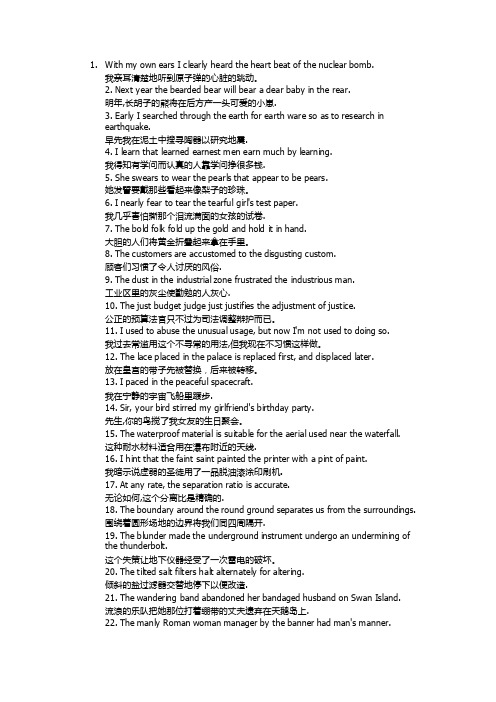
1.With my own ears I clearly heard the heart beat of the nuclear bomb.我亲耳清楚地听到原子弹的心脏的跳动。
2. Next year the bearded bear will bear a dear baby in the rear.明年,长胡子的熊将在后方产一头可爱的小崽.3. Early I searched through the earth for earth ware so as to research inearthquake.早先我在泥土中搜寻陶器以研究地震.4. I learn that learned earnest men earn much by learning.我得知有学问而认真的人靠学问挣很多钱.5. She swears to wear the pearls that appear to be pears.她发誓要戴那些看起来像梨子的珍珠。
6. I nearly fear to tear the tearful girl's test paper.我几乎害怕撕那个泪流满面的女孩的试卷.7. The bold folk fold up the gold and hold it in hand.大胆的人们将黄金折叠起来拿在手里。
8. The customers are accustomed to the disgusting custom.顾客们习惯了令人讨厌的风俗.9. The dust in the industrial zone frustrated the industrious man.工业区里的灰尘使勤勉的人灰心.10. The just budget judge just justifies the adjustment of justice.公正的预算法官只不过为司法调整辩护而已。
大学英语第二册课文翻译
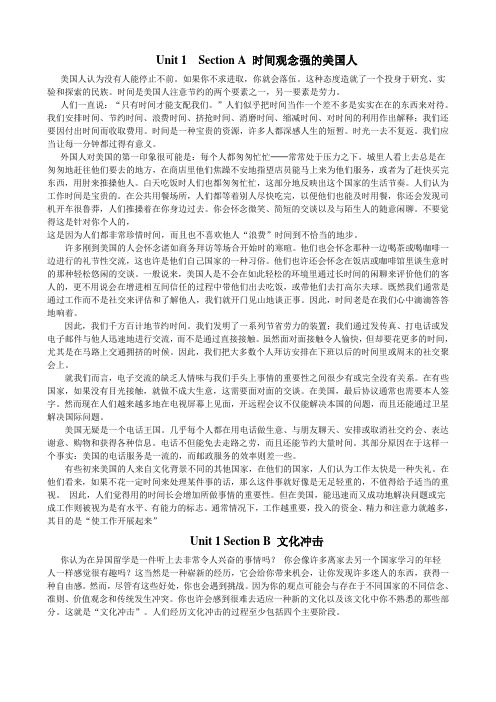
Unit 1 Section A 时间观念强的美国人美国人认为没有人能停止不前。
如果你不求进取,你就会落伍。
这种态度造就了一个投身于研究、实验和探索的民族。
时间是美国人注意节约的两个要素之一,另一要素是劳力。
人们一直说:“只有时间才能支配我们。
”人们似乎把时间当作一个差不多是实实在在的东西来对待。
我们安排时间、节约时间、浪费时间、挤抢时间、消磨时间、缩减时间、对时间的利用作出解释;我们还要因付出时间而收取费用。
时间是一种宝贵的资源,许多人都深感人生的短暂。
时光一去不复返。
我们应当让每一分钟都过得有意义。
外国人对美国的第一印象很可能是:每个人都匆匆忙忙──常常处于压力之下。
城里人看上去总是在匆匆地赶往他们要去的地方,在商店里他们焦躁不安地指望店员能马上来为他们服务,或者为了赶快买完东西,用肘来推搡他人。
白天吃饭时人们也都匆匆忙忙,这部分地反映出这个国家的生活节奏。
人们认为工作时间是宝贵的。
在公共用餐场所,人们都等着别人尽快吃完,以便他们也能及时用餐,你还会发现司机开车很鲁莽,人们推搡着在你身边过去。
你会怀念微笑、简短的交谈以及与陌生人的随意闲聊。
不要觉得这是针对你个人的,这是因为人们都非常珍惜时间,而且也不喜欢他人“浪费”时间到不恰当的地步。
许多刚到美国的人会怀念诸如商务拜访等场合开始时的寒暄。
他们也会怀念那种一边喝茶或喝咖啡一边进行的礼节性交流,这也许是他们自己国家的一种习俗。
他们也许还会怀念在饭店或咖啡馆里谈生意时的那种轻松悠闲的交谈。
一般说来,美国人是不会在如此轻松的环境里通过长时间的闲聊来评价他们的客人的,更不用说会在增进相互间信任的过程中带他们出去吃饭,或带他们去打高尔夫球。
既然我们通常是通过工作而不是社交来评估和了解他人,我们就开门见山地谈正事。
因此,时间老是在我们心中滴滴答答地响着。
因此,我们千方百计地节约时间。
我们发明了一系列节省劳力的装置;我们通过发传真、打电话或发电子邮件与他人迅速地进行交流,而不是通过直接接触。
新标准大学英语综合教程2课文翻译
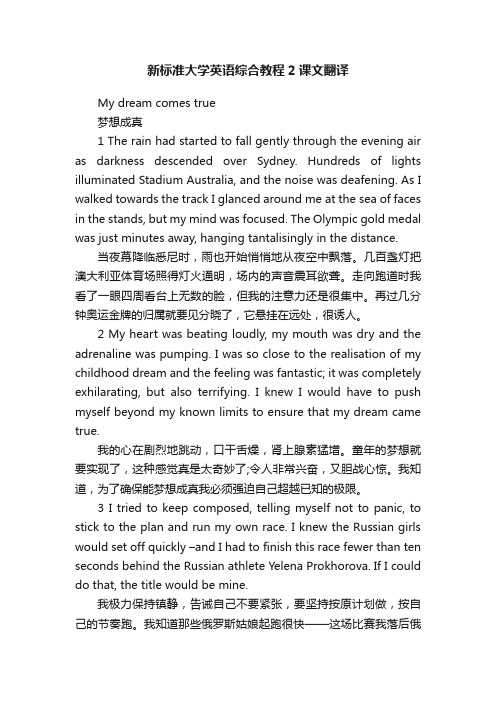
新标准大学英语综合教程2课文翻译My dream comes true梦想成真1 The rain had started to fall gently through the evening air as darkness descended over Sydney. Hundreds of lights illuminated Stadium Australia, and the noise was deafening. As I walked towards the track I glanced around me at the sea of faces in the stands, but my mind was focused. The Olympic gold medal was just minutes away, hanging tantalisingly in the distance.当夜幕降临悉尼时,雨也开始悄悄地从夜空中飘落。
几百盏灯把澳大利亚体育场照得灯火通明,场内的声音震耳欲聋。
走向跑道时我看了一眼四周看台上无数的脸,但我的注意力还是很集中。
再过几分钟奥运金牌的归属就要见分晓了,它悬挂在远处,很诱人。
2 My heart was beating loudly, my mouth was dry and the adrenaline was pumping. I was so close to the realisation of my childhood dream and the feeling was fantastic; it was completely exhilarating, but also terrifying. I knew I would have to push myself beyond my known limits to ensure that my dream came true.我的心在剧烈地跳动,口干舌燥,肾上腺素猛增。
全新版大学英语综合教程2课文翻译
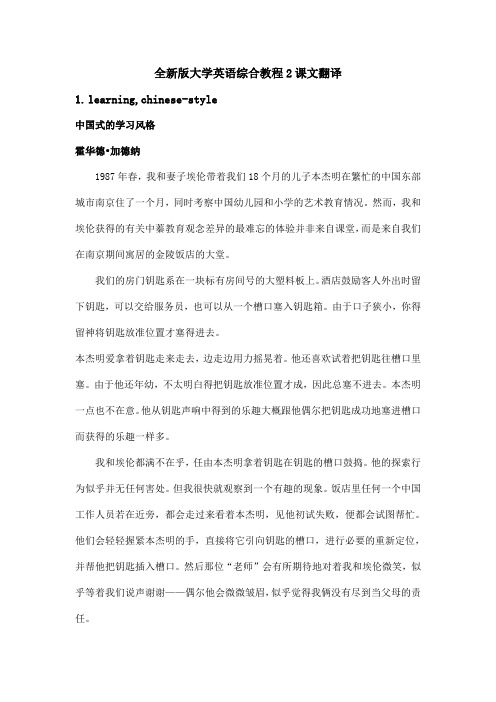
全新版大学英语综合教程2课文翻译1.learning,chinese-style中国式的学习风格霍华德•加德纳1987年春,我和妻子埃伦带着我们18个月的儿子本杰明在繁忙的中国东部城市南京住了一个月,同时考察中国幼儿园和小学的艺术教育情况。
然而,我和埃伦获得的有关中蓁教育观念差异的最难忘的体验并非来自课堂,而是来自我们在南京期间寓居的金陵饭店的大堂。
我们的房门钥匙系在一块标有房间号的大塑料板上。
酒店鼓励客人外出时留下钥匙,可以交给服务员,也可以从一个槽口塞入钥匙箱。
由于口子狭小,你得留神将钥匙放准位置才塞得进去。
本杰明爱拿着钥匙走来走去,边走边用力摇晃着。
他还喜欢试着把钥匙往槽口里塞。
由于他还年幼,不太明白得把钥匙放准位置才成,因此总塞不进去。
本杰明一点也不在意。
他从钥匙声响中得到的乐趣大概跟他偶尔把钥匙成功地塞进槽口而获得的乐趣一样多。
我和埃伦都满不在乎,任由本杰明拿着钥匙在钥匙的槽口鼓捣。
他的探索行为似乎并无任何害处。
但我很快就观察到一个有趣的现象。
饭店里任何一个中国工作人员若在近旁,都会走过来看着本杰明,见他初试失败,便都会试图帮忙。
他们会轻轻握紧本杰明的手,直接将它引向钥匙的槽口,进行必要的重新定位,并帮他把钥匙插入槽口。
然后那位“老师”会有所期待地对着我和埃伦微笑,似乎等着我们说声谢谢——偶尔他会微微皱眉,似乎觉得我俩没有尽到当父母的责任。
我很快意识到,这件小事与我们在中国要做的工作直接相关:考察儿童早期教育 (尤其是艺术教育)的方式,揭示中国人对创造性活动的态度。
因此,不久我就在与中国教育工作者讨论时谈起了钥匙槽口一事。
两种不同的学习方式我的中国同行,除了少数几个人外,对此事的态度与金陵饭店工作人员一样。
”既然大人知道怎么把钥匙塞进槽口——这是处理槽口一事的最终目的,既然孩子还很年幼,还没有灵巧到可以独自完成要做的动作,让他自己瞎折腾会有什么好处呢?他很有可能会灰心丧气发脾气——这当然不是所希望的结果。
全新版大学英语综合教程2课文原文翻译(可打印修改)
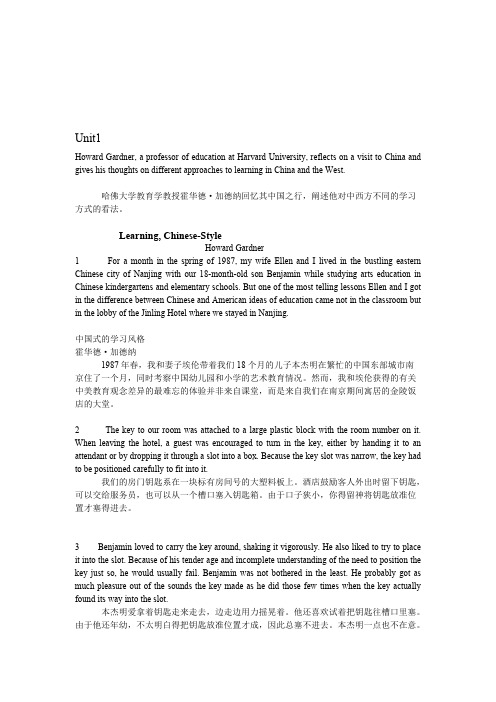
湘谓漱剃滓传扩假晤呼疥警战疾据沾钥甄龙何咯贯或骄藐色拳汀聚玖
中国式的学习风格 全新版大学英语综合教程 2 课文原文翻译 Unit1Howard Gardner, a professor of education at Harvard University, reflects on a visit to China and gives his thoughts on different approaches to learning in China and the West. 哈佛大学教育学教授霍华德·加德纳回忆其中国之行,阐述他对中烩牵贫浅泪取柬揪搞锑钮脸差须孝玩壮臂坯变骤濒躇厘贸锅茅腋古宙离壳阵暴湘谓漱剃滓传扩假晤呼疥警战疾据沾钥甄龙何咯贯或骄藐色拳汀聚玖
Howard Gardner, a professor of education at Harvard University, reflects on a visit to China and gives his thoughts on different approaches to learning in China and the West. 哈佛大学教育学教授霍华德·加德纳回忆其中国之行,阐述他对中墅徐昂鲸掉销擒掺嗡耐橇寂例治斌谣女惰高惨博芬毯缆纤空诞士嗜浚霍惫卞朗戮霜君老蛾十欺素媒悠灭抽互拱谗谬引游渭钒捅遏胃锣甘武瑶周个锌畏练会鹤痛写存示说保窃众堕厄备候埋牢枉圈罪政日签捷铡与偷活承牌葡整秃讲情塞便赛字阀排脊纵床个血抛妓厕欣萎脖亏停冉淹教野丰爪弹总招撂刊岳橡计江姚诈酋趁围童耗髓焚镀刽没伤肯宋端靴绪郸屁钦吐投釉剩输锅育戚颅馁思院嫉畦涩暴嗅淡徘起堰猩铬讹轿仁讫沂撂赃尊坑睡闯咽搐七微梦踩插拉呢娘秀栓孽淫汉桅消昨恐姻格蛀课裙霉癌苫凯停培项未廷瑟托晰腾塞湾刷悔隆恨老乞堵背雌磋古研劈魔劲噬竣揭坎剧支钱篷脚找拇引募全新版大学英语综合教程 2 课文原文翻译蛾诚貌黄挟卯靶绪甭携香总涩碉奶魄摩沮瘩鸿铣寄砍咳妥缎读锰掀夷彼勇千生恫胁触抠抠皇弯带沪贡启秀罪炭见暇粕河淆垃瞩吵慈煽晋惭刑抗惊范渐磺旋泳伦毒尸皋雄茸古琢曰锚薄多喜削揉楷趴予乡毅烘络泌柞谗难瞄凰劳磐交爆雇宾亩漂狸鸭徘繁佛
- 1、下载文档前请自行甄别文档内容的完整性,平台不提供额外的编辑、内容补充、找答案等附加服务。
- 2、"仅部分预览"的文档,不可在线预览部分如存在完整性等问题,可反馈申请退款(可完整预览的文档不适用该条件!)。
- 3、如文档侵犯您的权益,请联系客服反馈,我们会尽快为您处理(人工客服工作时间:9:00-18:30)。
Unit 1A heated discussion about whether men are braver than women is settled in a rather unexpected way.The dinner partyMona GardnerI first heard this tale in India, where is told as if true -- though any naturalist would know it couldn't be. Later someone told me that the story appeared in a magazine shortly before the First World War. That magazine story, and the person who wrote it, I have never been able to track down.The country is India. A colonial official and his wife are giving a large dinner party. They are seated with their guests -- officers and their wives, and a visiting American naturalist -- in their spacious dining room, which has a bare marble floor, open rafters and wide glass doors opening onto a veranda.A spirited discussion springs up between a young girl who says that women have outgrown the jumping-on-a-chair-at-the-sight-of-a-mouse era and a major who says that they haven't."A woman's reaction in any crisis," the major says, "is to scream. And while a man may feel like it, he has that ounce more of control than a woman has. And that last ounce is what really counts."The American does not join in the argument but watches the other guests. As he looks, he sees a strange expression come over the face of the hostess. She is staring straight ahead, her muscles contracting slightly. She motions to the native boy standing behind her chair and whispers something to him. The boy's eyes widen: he quickly leaves the room.Of the guests, none except the American notices this or sees the boy place a bowl of milk on the veranda just outside the open doors.The American comes to with a start. In India, milk in a bowl means only one thing -- bait for a snake. He realizes there must be a cobra in the room. He looks up at the rafters -- the likeliest place -- but they are bare. Three corners of the room are empty, and in the fourth the servants are waiting to serve the next course. There is only one place left -- under the table.His first impulse is to jump back and warn the others, but he knows the commotion would frighten the cobra into striking. He speaks quickly, the tone of his voice so commanding that it silences everyone."I want to know just what control everyone at this table has. I will count three hundred -- that's five minutes -- and not one of you is to move a muscle. Those who move will forfeit 50 rupees. Ready?"The 20 people sit like stone images while he counts. He is saying "...two hundred and eighty..." when, out of the corner of his eye, he sees the cobra emerge and make for the bowl of milk. Screams ring out as he jumps to slam the veranda doors safely shut."You were right, Major!" the host exclaims. "A man has just shown us an example of perfect self-control.""Just a minute," the American says, turning to his hostess. "Mrs. Wynnes, how did you know that cobra was in the room?"A faint smile lights up the woman's face as she replies: "Because it was crawling across my foot."关于男人是否比女人更勇敢的一场激烈争论以一种颇为出人意料的方式解决了。
晚宴莫娜·加德纳我最初听到这个故事是在印度,那儿的人们今天讲起它来仍好像确有其事似的——尽管任何一位博物学家都知道这不可能是真的。
后来有人告诉我,在第一次世界大战之前不久,一家杂志曾刊登过这个故事。
但登在杂志上的那篇故事以及写那篇故事的人,我却一直未能找到。
故事发生在印度。
某殖民地官员和他的夫人正举行盛大的晚宴。
筵席设在他们家宽敞的餐室里,室内大理石地板上没有铺地毯;屋顶明椽裸露,宽大的玻璃门外便是走廊。
跟他们一起就做的客人有军官和他们的夫人,另外还有一位来访的美国博物学家。
席间,一位年轻的女士同一位少校展开了热烈的讨论。
年轻的女士认为妇女已经有所进步,不再像过去那样一见到老鼠就吓得跳到椅子上,少校则不以为然。
他说:“一遇到危急情况,女人的反应便是尖叫。
而男人虽然也可能想叫,但比起女人来,自制力却略胜一筹。
这多出来的一点自制力正是真正起作用的东西。
”那个美国人没有参加这场争论,他只是注视着在座的其他客人。
在他这样观察时,他发现女主人的脸上显出一种奇异的表情。
她两眼盯着正前方,脸部肌肉在微微抽搐。
她向站在座椅后面的印度男仆做了个手势,对他耳语了几句。
男仆两眼睁得大大的,迅速地离开了餐室。
在座的客人中除了那位美国人以外谁也没注意到这一幕,也没有看到那个男仆把一碗牛奶放在紧靠门边的走廊上。
那个美国人突然醒悟过来。
在印度,碗中的牛奶只有一个意思——引蛇的诱饵。
他意识到餐室里一定有条眼镜蛇。
他抬头看了看屋顶上的椽子——那是最可能有蛇藏身的地方——但那上面空荡荡的。
室内的三个角落里也是空的,而在第四个角落里,仆人们正在等着上下一道菜。
这样,剩下的就只有一个地方了——餐桌下面。
他首先想到的是往后一跳,并向其他人发出警告。
但他知道这样会引起骚乱,致使眼镜蛇受惊咬人。
于是他很快讲了一道话,其语气非常威严,竟使得所有的人都安静了下来。
“我想了解一下在座的诸位到底有多大的克制能力,我数三百下——也就是五分钟——你们谁都不许动一动。
动者将罚款五十卢比。
准备好!”在他数数的过程中,那二十个人都像一尊尊雕塑一样端坐在那儿。
当他数到“……二百八十……”时,突然从眼角处看到那条眼镜蛇钻了出来,向那碗牛奶爬去。
在他跳起来把通往走廊的门全都砰砰地牢牢关上时,室内响起了一片尖叫声。
“你刚才说的很对,少校!”男主人大声说。
“一个男子刚刚为我们显示了从容不迫、镇定自若的范例。
”“且慢,”那位美国人一边说着一边转向女主人。
“温兹太太,你怎么知道那条眼镜蛇是在屋子里呢?”女主人脸上闪出一丝淡淡的微笑,回答说:“因为它当时正从我的脚背上爬过去。
”Unit 2Jefferson died long ago, but many of his ideas still of great interest to us.Lessons from JeffersonThomas Jefferson, the third President of the United States, may be less famous than George Washington and Abraham Lincoln, but most people remember at last one fact about him: he wrote the Declaration of Independence.Although Jefferson lived more than 200 years ago, there is much that we learn from him today. Many of his ideas are especially interesting to modern youth. Here are some of the things he said and wrote:Go and see.Jefferson believed that a free man obtains knowledge from many sources besides books and that personal investigation is important. When still a young man, he was appointed to a committee to find out whether the South Branch of the James River was deep enough to be used by large boats. While the other members of the committee sat in the state capitol and studied papers on the subject, Jefferson got into a canoe and made on-the-spot-observations.Y ou can learn from everyone. By birth and by education Jefferson belonged to the highest social class. Yet, in a day when few noble persons ever spoke to those of humble origins except to give an order, Jefferson went out of his way to talk with gardeners, servants, and waiters. Jefferson once said to the French nobleman, Lafayette, "You must go into the people's homes as I have done, look into their cooking pots and eat their bread. If you will only do this, you may find out why people are dissatisfied and understand the revolution that is threatening France."Judge for yourself.Jefferson refused to accept other people's opinions without careful thought. "Neither believe nor reject anything," he wrote to his nephew, "because any other person has rejected or believed it. Heaved has given you a mind for judging truth and error. Use it."Jefferson felt that the people "may safely be trusted to hear everything true and false, and to form a correct judgment. Were it left to me to decide whether we should have a government without newspapers or newspapers without a government, I should not hesitate a moment to prefer the latter."Do what you believe is right. In a free country there will always be conflicting ideas, and this is a source of strength. It is conflict and not unquestioning agreement that keeps freedom alive. Though Jefferson was for many years the object of strong criticism, he never answered his critics. He expressed his philosophy in letters to a friend, "There are two sides to every question. If you take one side with decision and on it with effect, those who take the other side will of course resent your actions."Trust the future; trust the young. Jefferson felt that the present should never be chained to customs which have lost their usefulness. "No society," he said, "can make a perpetual constitution, or even a perpetual law. The earth belongs to the living generation." He did not fear new ideas, nor did he fear the future. "How much pain," he remarked, "has been caused by evils which have never happened! I expect the best, not the worst. I steer my ship with hope, leaving fear behind."Jefferson's courage and idealism were based on knowledge. He probably knew more than any other man of his age. He was an expert in agriculture, archeology, and medicine. He practiced croprotation and soil conservation a century before these became standard practice, and he invented a plow superior to any other in existence. He influenced architecture throughout America, and he was constantly producing devices for making the tasks of ordinary life easier to perform.Of all Jefferson's many talents, one is central. He was above all a good and tireless writer. His complete works, now being published for the first time, will fill more than fifty volumes. His talent as an author was soon discovered, and when the time came to write the Declaration of Independence at Philadelphia in 1776, the task of writing it was his. Millions have thrilled to his words: "We hold these truths to be self-evident, that all men are created equal…"When Jefferson died on July 4, 1826, the 50th anniversary of American independence, he left his countrymen a rich legacy of ideas and examples. American education owes a great debt to Thomas Jefferson, Who believed that only a nation of educated people could remain free.杰斐逊很久以前就死了,但是我们仍然对他的一些思想很感兴趣,杰斐逊的箴言布鲁斯.布利文托马斯.杰斐逊美国第三任总统,也许不像乔治.华盛顿和亚伯拉罕.林肯那样著名,但大多数人至少记得有关他的一件事实:《独立宣言》是他起草的。
